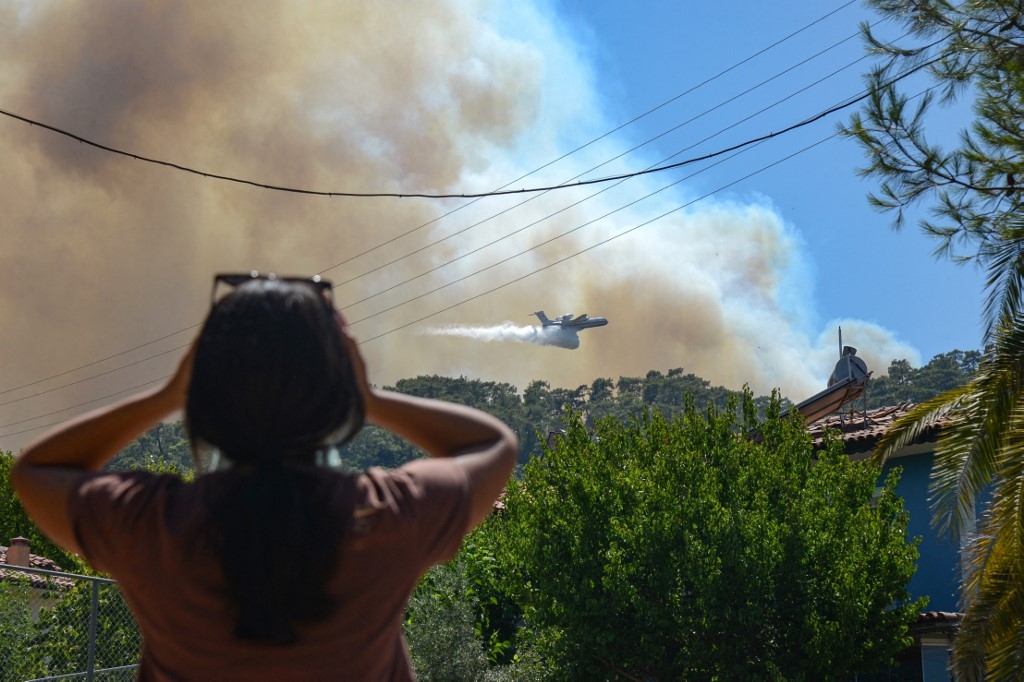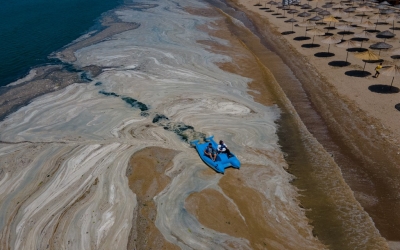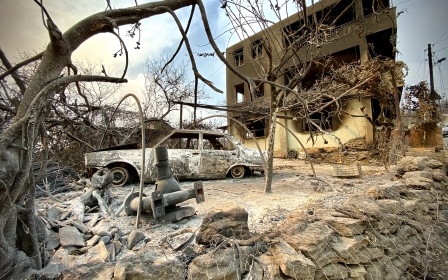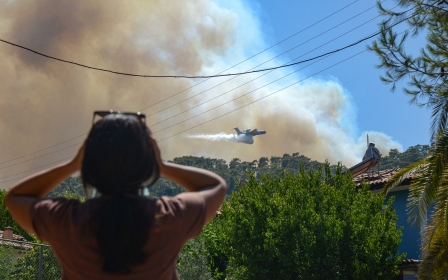Wildfires destroy Turkey's social fabric along with forests

When Ismail Bekar, an academic researching fire ecology, tried to explain on Twitter that Turkey's forest fires could have been triggered by global warming and record-breaking high temperatures, he was accused of normalising alleged arsonists, such as the PKK militant group and unnamed external powers.
“I’m accused of being a PKK member because I study fire ecology,” he tweeted last week.
The wildfires that have engulfed Turkey’s southern shores since 28 July have destroyed hundreds of hectares of forests and villages, killed at least eight people, and wounded hundreds. Yet the fires, which on Monday were continuing to rage in four southern provinces, have also revealed political faultlines in Turkish society and left the country divided. Conspiracies are a growing trend.
And debates and suspicions have even spread beyond social media, the common forum for such vicious debates.
Even notable journalists and commentators have pushed the theory that the PKK - Kurdish militants who have waged a decades-long war on the Turkish state - could have played a role in the fires, even though they are yet to come up with any evidence. For them, the mere fact that multiple fires in 17 different cities in just a handful of days are a highly unusual phenomenon is enough to declare enemies were responsible.
Cihat Yayci, a former admiral whose nationalist rhetoric on the eastern Mediterranean has won him a loyal following, is one such personality. He's alleged that the PKK joined forces with Greece to start the fires. The EU classifies the PKK as a terrorist group.
“There is no negligence or coincidence here. The state is facing Greek-PKK terror,” Yayci said.
Bekar says wildfires have been a normal and indeed a central part of the Mediterranean ecosystem over millennia. Yet climate change and human impact have created conditions that make these fires more likely.
“However, people reacted to me on social media as if I wasn’t trying to explain what happened, but normalising terrorism and attacks by external powers,” he told Middle East Eye (MEE).
Bekar is not alone. When this reporter tweeted that multiple fires had also ravaged forests in Spain, Italy, and Lebanon, with record-breaking heat and climate change cited by experts as the cause, I was also accused of siding with PKK and foreign actors by numerous Twitter users.
“We know who funds you,” said one, implying that I was taking money from European nations to undermine the Turkish nation.
The accusations are being felt on the ground, too. In Antalya, a group of villagers - some armed - have begun guarding roads, preventing cars with plates from outside the province from entering rural areas.
Translation: Some armed groups are stopping and checking the cars in Antalya where forest fires continue
In another area, two people were nearly lynched over suspicions that they were arsonists or PKK militants when in reality they had come to Antalya's Manavgat over the weekend to help relief efforts.
Suspicions have been compounded by a mysterious new group called Children of Fire claiming responsibility for the fires and alleging it is a PKK splinter group. Again, this group has offered no evidence it is responsible or connected to the Kurdish militants.
Emre Erdogan, a sociology professor who studies polarisation in Turkish society, says the lack of trusted and independent mainstream media is behind the partisanship in Turkey.
“Everyone has its own partisan media and everyone believes in a different world with different realities,” he told MEE. “People live in echo chambers and cannot reach one another’s reality.”
Growing controversy
Then came the controversy surrounding the lack of government preparedness against the fires.
As firefighting efforts faltered on Friday, President Recep Tayyip Erdogan acknowledged that the government doesn't own any specialist aircraft and relies instead on private companies to rent them alongside helicopters.
The opposition has in turn criticised the government for not making use of some Canadair aircraft owned by the Turkish Air Institute (THK), an association founded by Ataturk and now controlled by the government after alleged mismanagement.
Ankara's refusal to accept assistance from the EU and Greece has also drawn ire. Only firefighters and equipment from Ukraine, Russia, Azerbaijan, and Qatar have been accepted.
Anger and frustration with the government's response came to a head last week when angry Antalya residents booed Foreign Minister Mevlut Cavusoglu and demanded more firefighting planes. Such an open confrontation with a top official in Erdogan's government is unheard of.
Amid the government's struggle to put out the fires, Erdogan travelled to Izmir’s Manavgat to visit the site of the disaster, but ruffled feathers along the way. His huge convoy blocked roads, and traditional gestures such as throwing tea and toys to bystanders from the bus fell flat and angered many.
But while Ankara seems reluctant to accept help from some, ordinary people have flooded Instagram and Twitter with requests to #HelpTurkey. Some two million tweets were posted using the hashtag, most of them repeating the same line: “We are in need of fire planes and assistance to put a stop to the fires.”
Some experts, like online political speech analyst Marc Owen Jones, have noted that the volume of tweets posted with the hashtag appears suspiciously irregular. Yet the hashtag is highly popular among all kinds of accounts, both popular and more obscure.
Recent polls indicate that the government is suffering its lowest popularity since coming into office in 2002, amid high inflation and widespread unemployment.
The government's supporters are keen to blame external actors for the growing discontent around the wildfires.
Erdogan’s communications director Fahrettin Altun said the #HelpTurkey campaign was orchestrated by a single entity, and its aim was to present Turkey as a weak state. He began spreading another hashtag, #StrongTurkey, saying that the government had brought 122 fires out of 129 in 35 provinces under control.
“There is no bipartisan position left in Turkey,” Yildiray Ogur, a columnist for Karar daily, told MEE.
'There is no bipartisan position left in Turkey. The truth is an orphan in a polarised society'
- Yildiray Ogur, columnist
“The truth is an orphan in a polarised society. No one makes enough effort to resolve the outstanding issues as much as they do to propagate. If there is a failure in combating the wildfires, suddenly someone [from the government circles] says it was PKK who started them, hence the focus changes.”
Ogur believes national crises such as wildfires or flooding are the result of underlying governing problems caused by concentrating the executive powers in a single person. Since a 2017 referendum, Turkey has been ruled by a system where much power rests in the presidency.
Many believe polarisation in Turkish society will continue, as the country is nearing a fraught presidential election in 2023 that could be pivotal for the country.
“Our type of governance isn’t based on dialogue and power-sharing and we don’t change our political system,” Erdogan, the academic, said.
“The presidential system is a zero-sum game. And it really works well for the populist politicians since it gives them enough ammunition to grow their own political camp and pushes everyone to take partisan lines."
This article is available in French on Middle East Eye French edition.
Middle East Eye delivers independent and unrivalled coverage and analysis of the Middle East, North Africa and beyond. To learn more about republishing this content and the associated fees, please fill out this form. More about MEE can be found here.





